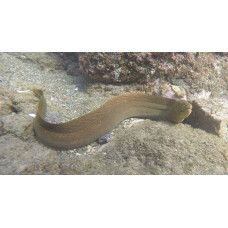Latin name
Echidna nocturna
Other name
Palenose moray, greyface moray eel, slender moray, white-eyed moray.
Identification
The freckled moray eel has a long, snake-like body with an average of 120 vertebrae.
Features of fish fins
The dorsal fin runs along the back just behind the head and merges seamlessly with the caudal and anal fins.
Fish colouring
These fish are grey-brown in colour with rows of small white spots along the body. Their nose is lighter in colour than the rest of their body.
Distribution
Widespread throughout the tropical eastern Pacific Ocean.
Habitat
Marine benthic species. Depth ranges from 0 to 30 metres. They are found both in intertidal areas and on coral reefs. Like other morays, they have a pelagic larval phase.
Size
The average adult length is 48.26 cm. Juveniles range in size from 8.52 cm to 35.48 cm with an average length of 22 cm. They weigh from 1.12 g to 296.1 g with an average of 49.62 g.
Behavior
Juveniles typically inhabit rocky coastal pools, while adults live near pools or on coral reefs.
Food and feeding habits
An extremely carnivorous species. Their diet consists mainly of shrimps of the family Penaeoidea. They also eat crabs (Brachyura), lobsters and clams, and possibly other soft-bodied invertebrates.
Reproduction
Possibly a protogynous hermaphrodite.
Fishing
The species is of negligible commercial interest in fisheries.
Relationship with a person
Harmless.
| Classification | |
| Phylum | Chordata |
| Class | Actinopterygii |
| Squad | Anguilliformes |
| Family | Muraenidae |
| Genus | Echidna |
| Species | E. nocturna |
| Features | |
| Conservation status | Least Concern |
| Habitat | Pelagic |
| Life span, years | No information |
| Maximum body weight, kg | 0,296 |
| Maximum length, cm | 48,26 |
| Sailing speed, m/s | No information |
| Threat to people | Not edible |
| Way of eating | Predator |
Freckled moray
Tags: freckled moray

